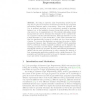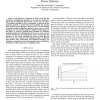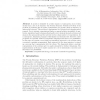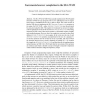17 search results - page 2 / 4 » The scope and limits of simulation in automated reasoning |
LPNMR
2001
Springer
13 years 9 months ago
2001
Springer
Abstract. According to Dynamic Logic Programming (DLP), knowledge may be given by a sequence of theories (encoded as logic programs) representing different states of knowledge. Th...
JETC
2008
13 years 3 months ago
2008
With aggressive reductions in feature sizes and the integration of multiple functionalities on the same die, bottlenecks due to I/O pin limitations have become a severe issue in to...
ICLP
2004
Springer
13 years 10 months ago
2004
Springer
A protein is identified by a finite sequence of aminoacids, each of them chosen from a set of 20 elements. The Protein Structure Prediction Problem is the problem of predicting t...
ICLP
2009
Springer
14 years 5 months ago
2009
Springer
The SLG-WAM of XSB Prolog soundly implements the Well-Founded Semantics (WFS) for logic programs, but in a few pathological cases its engine treats atoms as undefined that are true...
FLAIRS
2008
13 years 7 months ago
2008
One of the central problems in building broad-coverage story understanding systems is generating expectations about event sequences, i.e. predicting what happens next given some a...




